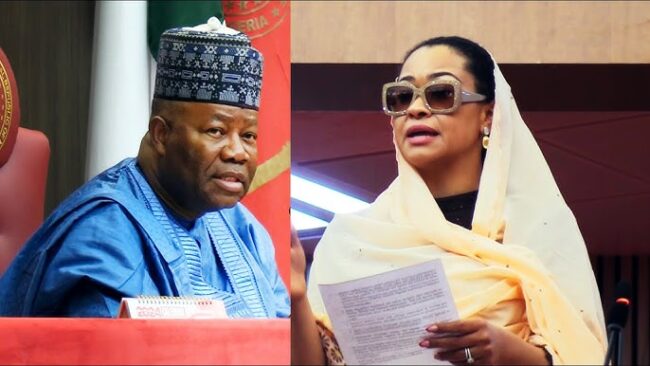The World Bank report on Nigeria’s poverty level has been greeted with widespread outcry, with some interest groups demanding urgent action from the government to avoid a poverty-induced economic meltdown. The International Monetary Fund, IMF, and the World Bank, at the just-concluded 2025 Spring meetings in Washington, D.C., United States, disclosed a gloomy picture of Nigeria’s economic outlook in the short to medium term.
What stands out in the report was the downgrading of the country’s economic growth forecast, which concludes that the country’s economic policy reforms are largely ineffective in addressing inclusive growth. Where the global agencies declared that poverty rate will continue to sink the country severely through 2027.
However, economy observers and Civil Society Organizations, CSOs, expressed embarrassment over Nigeria’s rating in the Spring meetings at the end of the World Bank/ IMF meetings.
After highlighting the key challenges the forum also made recommendations targeted at salvaging the economy from the looming danger predicted by the global institutions.
Accordingly, while commenting on the World Bank’s verdict on Nigeria’s economy, President of the Nigerian Association of Chambers of Commerce, Industry, Mines, and Agriculture (NACCIMA), Dele Oye, proposed some short-term interventions that could help salvage Nigeria’s vulnerable population and make meaningful progress in the fight against poverty.
Another agency called ActionAid Nigeria (AAN) said it was not surprised by the harsh projections of the World Bank, while expressing its concerns about the World Bank’s verdict
The Country Director, AAN, Andrew Mamedu, said, “ActionAid Nigeria is deeply concerned, yet unsurprised, by the grim projections from the World Bank’s April 2025 Africa’s Pulse report, which forecasts a 3.6 percentage point increase in Nigeria’s poverty rate by 2027.
“Governance remains Nigeria’s greatest obstacle. The World Bank has clearly highlighted the country’s poor performance on governance indicators such as government effectiveness, accountability, and political stability, which remain among the weakest in Africa.
He revealed that Public institutions have continued to fail in managing resources and delivering basic services, which is also widening the trust deficit between citizens and government.
”Institutions like the National Assembly, Judiciary, and others, who are supposed to hold the government accountable and ensure resources are available for the people, are rather making routine approvals and focus on issues that do not support the populace.
”While poverty deepened, the federal, state governments and lawmakers prioritized luxury over lives, budgeting billions for new SUVs and renovation of offices.
The statement added, ”President Tinubu’s administration has continued to sidestep meaningful structural reforms, pushing social protection rhetoric that barely scratches the surface, while ignoring the real cries of the people.
”So, the World Bank is right to raise the alarm, but Nigerians have been raising it long before now.
”Let it be clear: the current trajectory will only fuel further migration, brain drain, instability, and disillusionment. Nigeria is at risk of becoming the global capital of extreme poverty, despite being Africa’s largest economy.
”While the government may claim economic progress, the reality is that the rich are getting richer, benefiting from policies like those in the banking sector where profits have soared to N3.41 trillion, while the poor are getting poorer.
”This is not inclusive growth. Reforms must ensure that the most vulnerable benefit.”
It’s Sad For Nigeria – Adeyanju
While commenting on the world Bank report, a human rights lawyer and activist, Deji Adeyanju, said, “The World Bank’s Africa’s Pulse report for April 2025 paints a sobering picture for Nigeria, forecasting a 3.6 percentage point increase in poverty by 2027, driven by structural economic weaknesses, overreliance on oil, and national fragility.
According to activist, ”This projection highlights a harsh reality: Nigeria, despite being Africa’s largest economy, remains a global epicenter of poverty, hosting 15% of the world’s extremely poor population, with over 106 million Nigerians living below the $2.15 per day threshold in 2024.
“Nigeria’s poverty crisis is both deep and multifaceted, characterized by income poverty, multidimensional deprivation, and stark inequality.
”Key data points illustrate the scale of the challenge: In 2023, 38.9% of Nigerians (approximately 87 million people) lived below the national poverty line, making Nigeria the world’s second-largest poor population after India. By 2024, 106 million Nigerians were in extreme poverty, reflecting a persistent upward trend.
“Inflation, driven by food and fuel price spikes, erodes purchasing power. ”The naira’s 40% depreciation in 2024 amplified import costs, disproportionately affecting the poor.
“Insecurity disrupts agricultural production, displaces communities, and deters investment, particularly in northern Nigeria, where poverty is most acute.
“With 3.5 million Nigerians entering the labor force annually, weak job creation and entrepreneurial prospects drive unemployment and emigration, further entrenching poverty”.
Poverty, economic failures Are All There — CISLAC
The Executive Director, Civil Society Legislative and Advocacy Centre, CISLAC, Awual Rafsanjani while speaking to vanguard said, “This report coming from the World Bank is not surprising to us because all the signs are there. We have been advising the Nigerian government to carry out better reforms, economic reforms to address poverty, inequality, and ensure financing for development, and block or reduce or minimize opportunities for corruption and embezzlement.
”There’s no way you can have this kind of tendency of reckless spending, looting, excessive borrowing for just personal consumption or diversion, and lack of productivity in the economy without adverse consequence. ”Even our trade and investment is not yielding the result it’s supposed to yield, and definitely this projection by the World Bank will not be a surprising thing.
“In most of our States, the governors and the leadership are not harnessing the resources in their States. Rather they embark on gigantic unproductive projects just for the sake of taking money away, not for addressing gaps in education, in healthcare system, and even in the infrastructure.
”If this kind of mindset is continued, there’s no way you can deal with the issues of poverty and inequality because if the whole idea of governance is to grab the resources, is to steal the money, is to institutionalize impunity and recklessness in governance, definitely you will continue to witness more Nigerians experiencing poverty”.
How We Can Dodge The Crises – NACCIMA
ACCIMA boss, Oye, who is currently the Chairman of the Organized Private Sector of Nigeria (OPSN), has recommended some steps on how Nigeria can dodge the World Bank’s poverty prediction saying, “The government should implement well-structured and targeted stimulus packages focused on vulnerable populations”.
According to him, such measures, should include cash transfers, food assistance programmes, and direct support to small and medium enterprises (SMEs) to stimulate job creation.
More so, “Independent monitoring and thorough evaluation must be instituted across all processes to curb instances of abuse and corruption.
“Given that a significant proportion of Nigerians rely on agriculture for their livelihoods, there is a need for targeted investment in this sector.
Subsidizing inputs, providing long-term single-digit credit, and expanding training programmes can help increase food security and foster sustainable livelihoods.
“Expanding access to microfinance for small businesses, cooperatives, and entrepreneurs will promote self-employment and help reduce poverty.
“Facilitating favourable lending conditions specifically for women and youth is crucial, alongside the urgent development of youth-targeted capital to address the ongoing trend of the “Japa Syndrome”.
“Establishing robust vocational and skills training programmes for the unemployed and underemployed will enhance employability and support new entrepreneurs in high-demand sectors.
“Improving infrastructure, particularly in rural areas, will increase market access for farmers and small businesses, leading to increased incomes and, ultimately, poverty reduction.
“There is a need to introduce tax incentives for businesses investing in underserved regions and for those prioritising local employment.
“Public-private partnerships should be encouraged to finance economic development initiatives, leveraging combined resources and expertise for efficient delivery of social impact.
“Expanding social safety nets, which include unemployment benefits and healthcare access, will provide much-needed relief to those facing financial distress and support their pathways to recovery.
“It is vital for the government to act swiftly and decisively to restore peace and security, especially in rural communities, thereby creating a stable environment for agricultural productivity and investment.
“Nigeria should reduce its reliance on raw material exports and instead prioritise adding value through local manufacturing.”
We Should Stop playing politics with people’s lives — AAN
While making some recommendations to curb the menace, ActionAid Nigeria (AAN) called on the Federal Government to “Stop playing politics with people’s lives and fully strengthen and expand social protection, including universal cash transfers and food support for the most vulnerable”.
They also called for protection of smallholder farmers by tackling insecurity and ensuring access to markets, inputs, and tools to boost local food production.
He further recommended that “Scrap all non-essential public spending particularly the outrageous allocations to government officials’ lifestyles and channel funds to education, healthcare, and job creation; Stabilise the economy through transparent and people-centred fiscal and monetary policies that protect the purchasing power of citizens”.
Making his own recommendations, Adeyanju stated: “To reverse the World Bank’s projected poverty increase by 2027, Nigeria must implement transformative, inclusive, and sustainable reforms.
“Diversify the Economy: Reduce oil dependence by investing in agriculture and technology, supporting agribusiness and job creation.
“Improve public spending transparency and engage citizens in budgeting to enhance governance; Invest in security and conflict prevention to stabilize regions and promote economic activities; Increase funding for education and healthcare to improve productivity and living standards; Support small and medium enterprises through financial incentives and incubation programs; Maintain tight monetary policies and subsidize essential goods to alleviate cost-of-living pressures.
“The World Bank’s forecast of rising poverty in Nigeria by 2027 is a clarion call for urgent action. By diversifying the economy, strengthening governance, expanding social protection, and investing in human capital and security, Nigeria can not only avert the projected poverty increase but also chart a path toward inclusive prosperity.” Vanguard.








